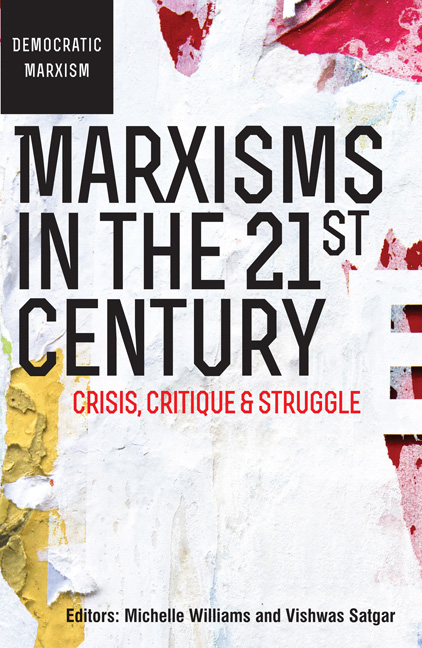Book contents
- Frontmatter
- Miscellaneous Frontmatter
- Acknowledgements
- Contents
- Acronyms and Abbreviations
- Introduction
- PART ONE DEMOCRATISING AND GLOBALISING MARXISM
- Chapter 1 Marxism and Democracy: Liberal, Vanguard or Direct?
- Chapter 2 Marxism after Polanyi
- Chapter 3 Transnationalising Gramscian Marxism
- PART TWO MARXISM AND LEFT POLITICS
- PART THREE CRISES OF MARXISM IN AFRICA AND POSSIBILITIES FOR THE FUTURE
- Conclusion
- Contributors
- Index
Chapter 3 - Transnationalising Gramscian Marxism
from PART ONE - DEMOCRATISING AND GLOBALISING MARXISM
Published online by Cambridge University Press: 21 April 2018
- Frontmatter
- Miscellaneous Frontmatter
- Acknowledgements
- Contents
- Acronyms and Abbreviations
- Introduction
- PART ONE DEMOCRATISING AND GLOBALISING MARXISM
- Chapter 1 Marxism and Democracy: Liberal, Vanguard or Direct?
- Chapter 2 Marxism after Polanyi
- Chapter 3 Transnationalising Gramscian Marxism
- PART TWO MARXISM AND LEFT POLITICS
- PART THREE CRISES OF MARXISM IN AFRICA AND POSSIBILITIES FOR THE FUTURE
- Conclusion
- Contributors
- Index
Summary
Antonio Gramsci (1891–1937), one of the most original Marxist thinkers of the twentieth century, was imprisoned by Benito Mussolini's regime in 1926 for his radical ideas and his leadership of the Italian Communist Party. He began writing his highly influential Prison Notebooks in 1929, the year the New York Stock Exchange crashed and capitalism entered the ‘Great Depression’. A central aspect of the problematic informing the Prison Notebooks is the ability of capitalism to reproduce itself through ruling-class strategies. At the same time, Gramsci's Prison Notebooks pondered how to elaborate a politics capable of transforming capitalism without degenerating into revolutionary voluntarism on the one hand, and economic determinism on the other. Today the world is living through the ‘Great Depression’ of the twenty-first century. In this context, drawing on Gramsci's theoretical corpus critically is extremely important to provide insight into the nature of the hegemonic crisis of capital; how ruling classes are responding to this crisis and how struggles for alternatives can be waged.
I begin this chapter by clarifying which Gramscian Marxism has to be transnationalised. This is important, given that Gramsci's own Marxism has been overlayed and in some senses obscured by varied interpretations, readings and sometimes abuses. Within twentieth-century Marxism, Gramsci has been reduced to a Western Marxist, an Italian Marxist–Leninist and even a Eurocommunist social democrat. First, I reconnect with the universal and critical core of Gramsci's own historical materialism. It is this historical materialism that is central to the project of transnationalising Gramscian Marxism in the twenty-first century. Second, I locate and trace how Gramsci's historical materialism has been brought into international relations and the global political economy. For the greater part of the twentieth century, Gramsci's Marxism has been considered irrelevant to understanding the expansionary tendencies and dynamics of capitalism. However, this has changed as the twentieth-century journey of Gramsci's Marxism inspired the emergence of a neo-Gramscian outgrowth. This transnationalising current of Gramsci's Marxism has challenged the mainstream orthodoxies of twentieth-century Marxism in terms of understanding the international dimension of capitalism.
To a large extent the rise of neo-Gramscian perspectives has engendered a crucial development ensuring Gramsci's Marxism a place in critical analyses of global capitalism and contributing to transformative politics. While this is both a novel and a creative theoretical outpouring, the neo-Gramscian moment is far from complete in terms of transnationalising Gramscian Marxism.
- Type
- Chapter
- Information
- Marxisms in the 21st CenturyCrisis, Critique & Struggle, pp. 53 - 82Publisher: Wits University PressPrint publication year: 2013



